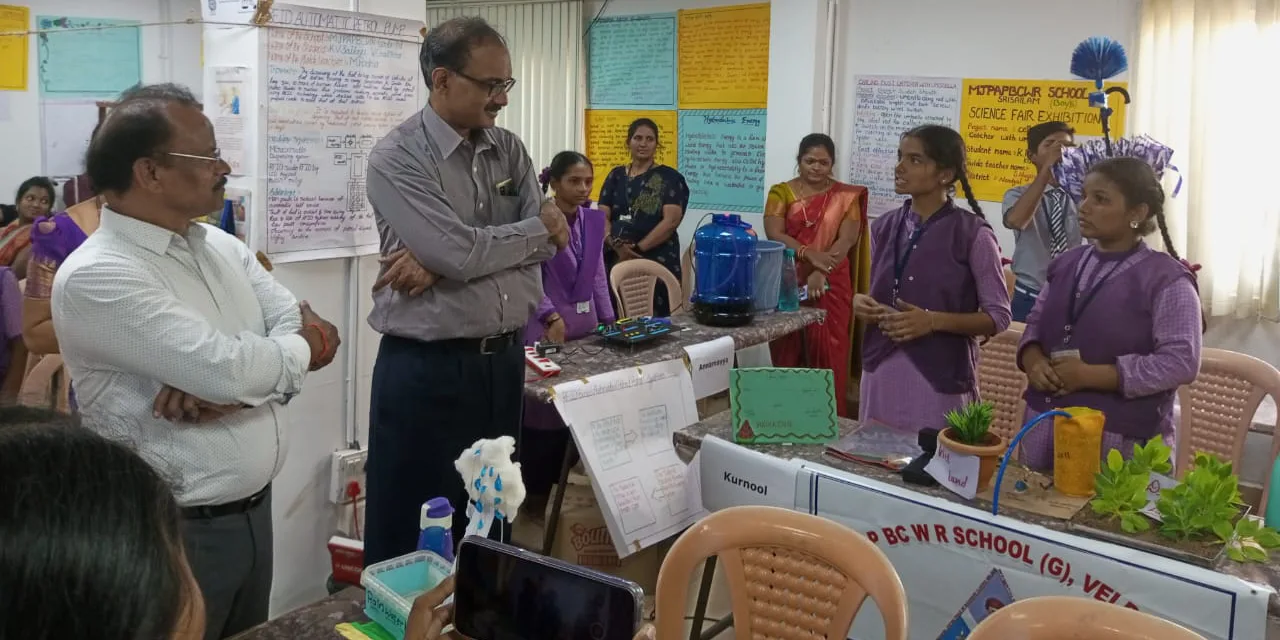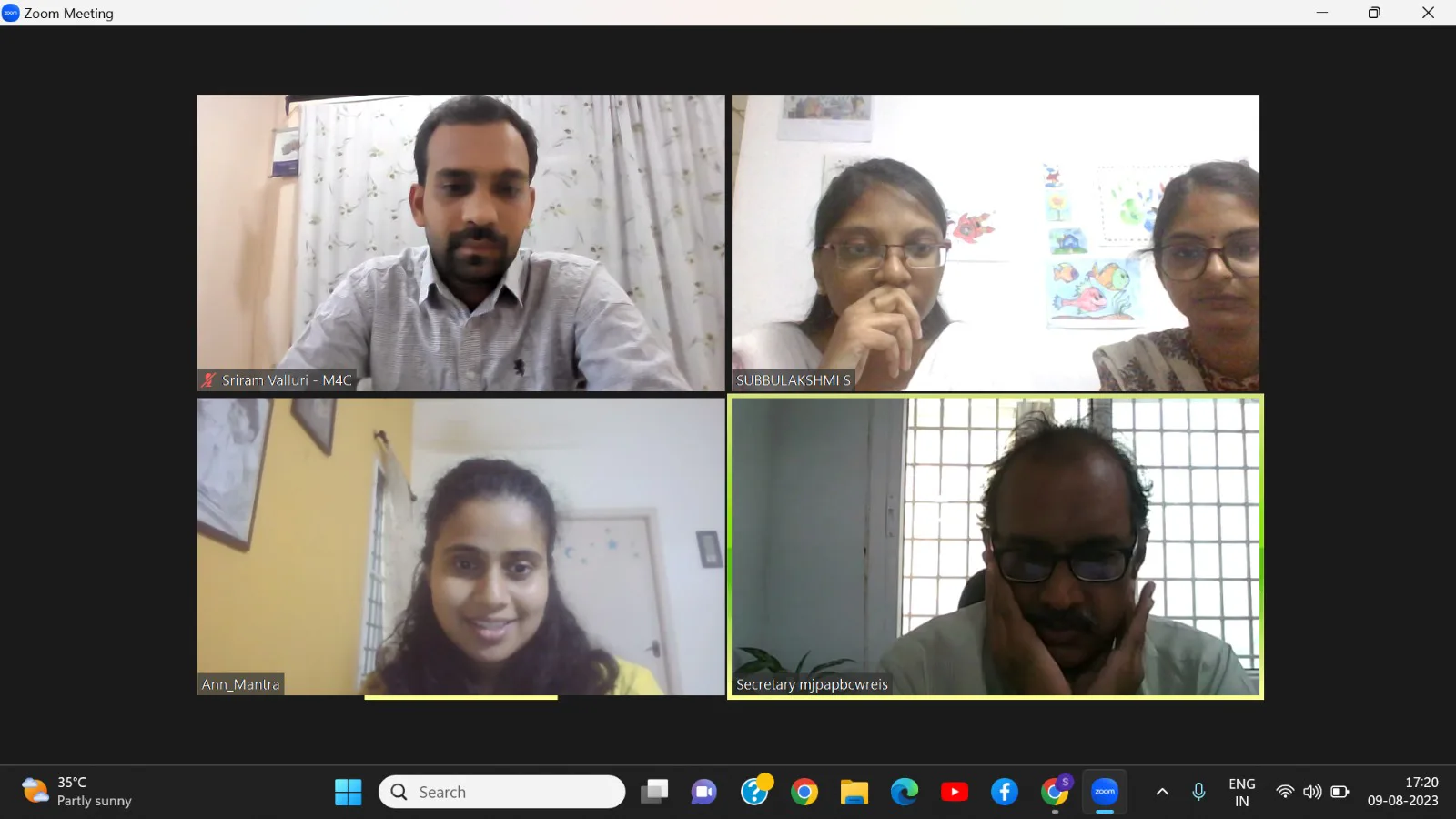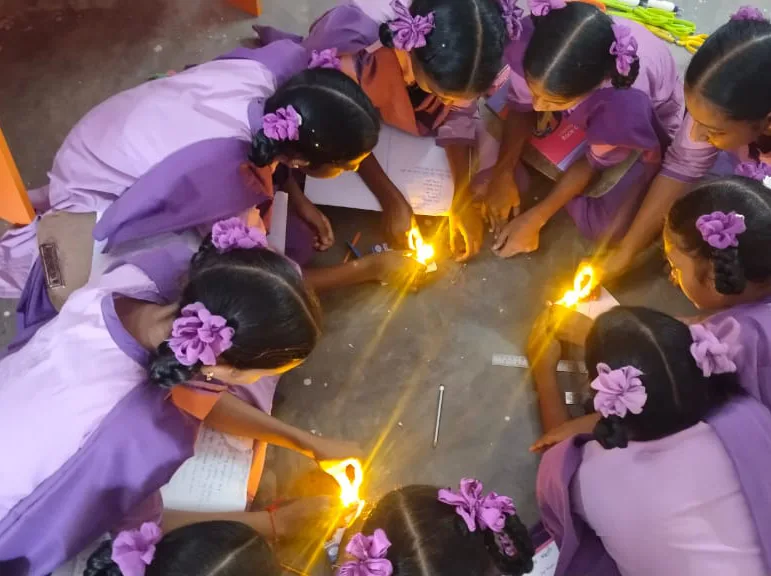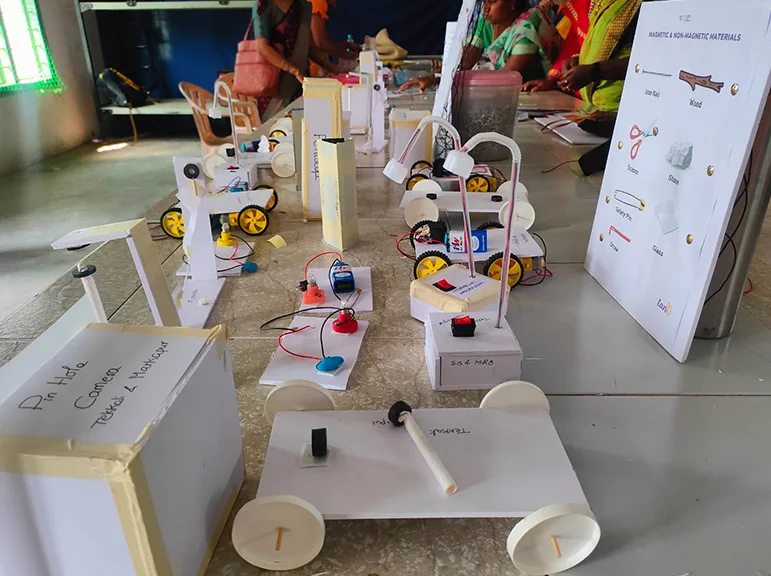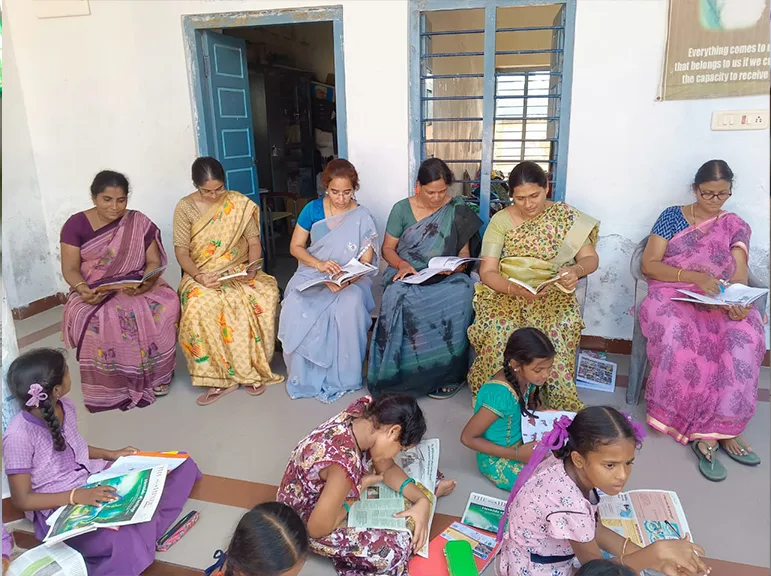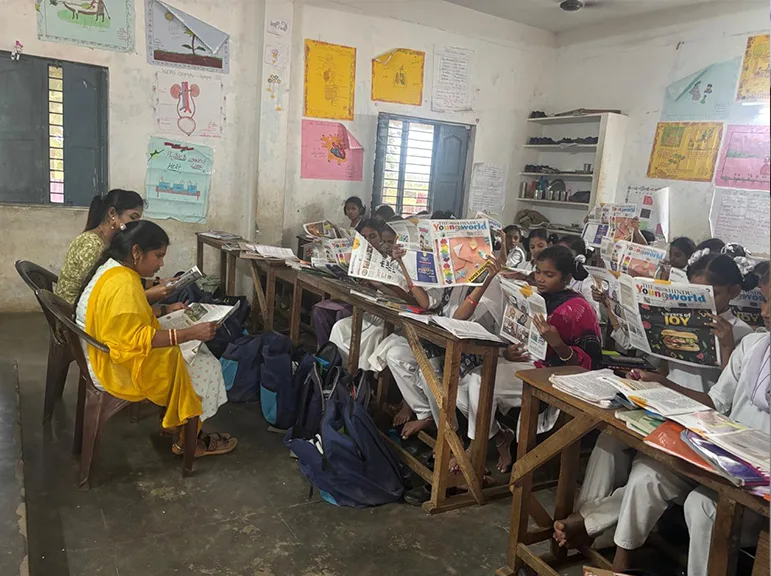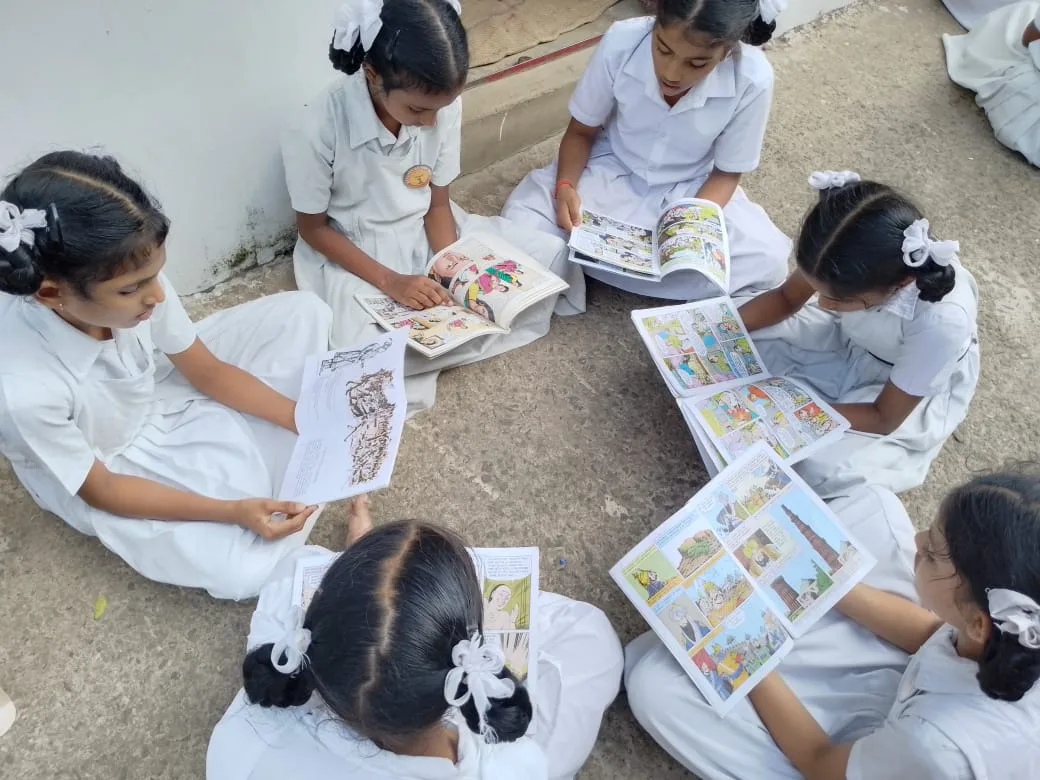The journey of a thousand miles begins with a small step. This adage might seem cloying, but it is definite and true to describe my journey with Mantra4change.
The year was 2022. By then, I had completed 7 years of my stint in the Mahatma Jyotiba Phule BC Welfare Residential Schools Society. I was doing what I was supposed to do: implement the curriculum, the scheduled academic calendar, strive for good results in SSC exams, and see that there was no adverse news coming up from the institutions. In a nutshell, I was trying to ensure that everything was under control.
When Mantra met me about an MOU with MJPAPBCWREIS, I felt happy that there was an opportunity to bring some spark into the humdrum routine of our school’s academic calendar. Although we were certainly aware of the need for engagement and interaction within the student and teacher community, we were not doing so in a planned and systematic manner. We were discussing outputs and results, and not outcomes and processes.
Even a sharp rock becomes blunt and gathers moss when it is not disturbed. The same thing had happened to us. Most of us had forgotten the learners and were busy in completing the syllabus, dictating the Q and A’s, going through the motions in general.
When you start telling someone that what you have been doing for years has to change, initially, there is reluctance and disagreement. First, we have to change their mindset and make them believe in the new interventions.
Mantra has a team of young leaders who believe in the transformative power of education. After the Team Leader, Ann, and others met me, they positioned a team in the MJP Head Office. Initially, Ravikanth, Jitender, and Sriram worked from remote locations, while Mekhela and Subbulakshmi were based at the Head Office in Vijayawada.
As the work deepened and expanded, more passionate individuals joined the team- Ravindra, Pavan, Pranathi, Anuvab, Ashish, and Vishmay each bringing their own strengths and commitment to reimagining education on the ground.
The early days during which Mantra tried to understand the working and hierarchy of MJPAPBCWREIS were really hectic as Mekhala and Subbalakshmi were eager to know the working of the society and we would sit for hours trying to figure out the program, the precise nature of work to be done, the involvement of the different stakeholders etc.
I also deputed Divyah PGT in English from Vemuladeevi School to be a part of the Mantra team.
When I reflect on what made Mantra click in MJP society, I believe it is the belief and enthusiasm of the Mantra team members. It is their love for children and their passionate commitment towards educational transformation. My philosophy of making the ‘learner’ the centre of the scheme of things and making learning enjoyable was an addendum.
The change that happened has been measured by third-party agencies and an audit. The variation from the Baseline assessment to the Endline assessment has shown remarkable enhancement in the learning potential of the learners.
What made this happen? How was it sustained over time?
The change happened from active engagement with all the stakeholders, starting from the school leaders, teachers, and learners. Generating acceptance and trust among the teachers and the parents was the main factor behind the strategy.
One can make use of data and statistics to build a case. But it is the heartwarming stories that bring joy and happiness.
In the BC Boys Residential school, Gurazala, where I attended a school Parent Teachers Meeting, a mother said:
“My son had stopped using expletives after he joined the institution in the Fifth standard. I felt that the Bridge Course and other academic programs had given a new orientation to my son and made him more studious.”
In the BC Girls Residential School, Narsapuram, a parent expressed that:
“The interaction between the teachers and the parents post the orientation through Mantra had made me feel more valued.”
Experience tells me that positive perception and generating a culture of learning and participation are crucial for nurturing education. The learner should have a sense of belonging and be involved in what is happening in the classroom.
I have said it many times during faculty meetings and interactive sessions:
“The real voyage of discovery consists not in seeking new landscapes but in having new eyes.”
This is so often true, especially in education, where we all have to unlearn a few things. But this is the most difficult part. Children, being in their formative years, are more welcoming. The adults and the teachers take more time to discard a few strategies and adapt to new things.
Project-Based Learning (PBL)
The spirited and reformist step that Mantra4change and MJPAPBCWREIS took was the introduction of PBL — Project-Based Learning.
Retention of learning becomes more concrete through the active involvement of learners. Active involvement comes from enjoyment and freedom to express, participate, and collaborate.
Peer learning, collaboration, learning while doing, communication, curiosity, and critical thinking: all parts of the New Education Policy are a part of project-based learning.
At the heart of project-based learning is creating space for the teachers and the students.
- For the teachers, it is the intellectual and professional space that comes from reengagement with the syllabus in an imaginative manner.
- For the students, it is the democratic and participative environment that is promoted by PBL; from reimagining seating inside the classroom, to breaking the hierarchy, from valuing understanding and comprehension than assessment, from inspiring experimentation than reproduction, ultimately from asking to innovate or create than obey, PBL becomes a game-changing activity.
Many students have reported that learning through PBL has been an exciting journey. Group discussions have become forums for the exchange of ideas, generating fruitful interaction.
Doing projects like 2D and 3D shapes, for example, inspires students to think big and plan to explore more such concepts in real life.
Stepping into the PBL classroom tells me that the net output or effect that comes from PBL cannot be measured by the enhancement of learning outcomes or potential alone.
Rather, it is the attitudinal change that has a cumulative or aggregating effect over the years that gives the student skills like enterprise, initiative, communication and invaluable traits like self-confidence and critical thinking.
TAN 90 Labs and Scientific Curiosity
The introduction of TAN 90 Labs in MJP institutions has sparked scientific curiosity and changed the way students relate to science.
It now feels tangible and engaging, no longer confined to just textbooks or distant imagination, but real, hands-on, and exciting.
Through our collaboration with Mantra4Change, 20 labs were set up across MJPAPBCWREIS, with nearly 18 of them allocated to girls’ schools.
The decision to primarily allocate science labs to girls’ schools marked a significant mindset shift.
One student from MJP Narsapuram, who once believed that circuits and other similar tools were only for boys, now not only enjoys working with them, with guidance from her science teacher, has come up with her own innovation:
“A chilli cutter.”
The Reading Program and DEAR (Drop Everything and Read)
Back in 2023, a simple conversation between me and Mr. Nikunj Jhaveri, Advisor at Mantra4Change, led to something special. It marked the beginning of the Reading Program in MJP institutions.
Since then, reading books has become a part of daily school life. Every time we visit a school, students eagerly ask for more books.
And their favourite genre?
Horror stories!
In 2025, the joy of reading further deepened with the introduction of DEAR (Drop Everything and Read).
Every Saturday, students, teachers, and the school community come together to read.
A student from MJP Machilipatnam shared:
“I like that the teachers sit with us and read the books together on Saturdays.”
That small gesture of teachers reading alongside students has made a big impact.
Reading is no longer just an activity; it’s something the students genuinely look forward to every day.
Micro Improvement Programs (MIP)
Beyond academics and books, Mantra4Change has also introduced Micro Improvement Programs over the past three years.
One such MIP is WOW (Wealth out of Waste), which began with the simple idea of making useful items from available or waste materials within the schools, upholding the principles of Reduce, Reuse, and Recycle.
It has now become a way of life in many institutions.
At MJP Penugonda, students made bird feeders from old water bottles and have been providing food to birds for the past two years.
At MJP Narpala, WOW is no longer just a project. It has become a daily practice.
From the first year of WOW implementation, the school adopted sustainability and zero-waste habits so effectively that it was awarded ISO certification for its commitment.
Sustaining the Change: Departmental Ownership and Future Readiness
Any meaningful transformation must eventually transcend the boundaries of external support and be owned by the system itself. While Mantra4Change continues to anchor many of the programs, it is heartening to observe the department’s early yet encouraging steps towards sustaining these changes independently. The real test, as I have mentioned, would be when the school leaders are asked to scale up these initiatives on their own. However, what our engagement with Mantra has initiated is a much-needed reflection on these issues and the necessary exposure to reimagine schooling.
Across various institutions, individual school leaders have started taking the cue. Schools like Narpala and Kottavalasa have been proactively promoting critical thinking among students and enhancing community engagement. These are not isolated efforts but indicative of a slow shift in ownership, where teachers and school heads are beginning to internalise the spirit of these reforms. As long as the program continues to sustain trust and enthusiasm among them, learning transformation will continue to happen.
The department, too, has begun initiating new activities without direct involvement from Mantra4Change. Regular academic competitions—Maths, General Knowledge, English quizzes, science fairs, sports meets, painting contests, and elocution—have become the norm. Further, by collaborating with organisations like UNESCO, we’ve started engaging students of classes 8 and 9 in conversations around climate change, sustainable development, and biodiversity. The formation of Red Cross units in each institution is another step that signifies how outreach is becoming an embedded part of school life.
Moreover, the institutionalisation of processes is underway. A state leadership committee has been formed to oversee programmatic engagement and reviews with teachers and school leaders, with handholding support from Mantra. A monthly departmental newsletter is being released, documenting progress, reflections, and innovations. As I’ve always believed, learning transformation is a slow and gradual process. It will take time and patience to rejuvenate tested patterns and procedures, but the direction is clear—and it is forward.
Conclusion
All these stories reflect quiet but meaningful changes unfolding across MJP institutions.
Students are becoming more curious, creative, responsible, and, most importantly, confident in their ability to learn and grow.
It’s a journey that continues, one step at a time, with a shared commitment from all stakeholders involved to make learning better for every child.
Contributors:
By A. Krishnamohan,
Director of Public Libraries, A.P
Former Secretary, MJPAPBCWREIS
With inputs from
Divyah Paga,
PGT English, MJP Vemuladeevi School


